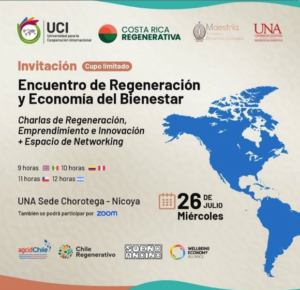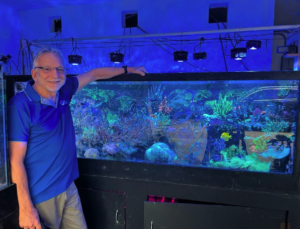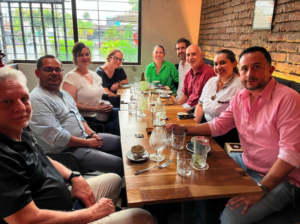Simon Ticehurst. WEAll Movements lead
I have just returned, renewed, from a visit to Nicoya in the peninsular province of Guanacaste, on the Pacific Coast of Costa Rica. The visit was part of an exchange program around regenerative economic experiences between Chile and Costa Rica, to which WEAll had been invited. Supported by the Chilean government’s Ministry of Science and Technology, the exchange highlighted the progress in advancing regenerative economic experiences in both countries. It was so inspiring to see this coming together of alternatives in practice and in place.
And Nicoya is an extraordinary place. Surrounded by green forests and nature reserves, it is emblematic of Costa Rica’s National Park System which was created in 1970 to protect and conserve the country’s national treasure, its extensive biodiversity. Costa Rica’s rainforests, wetlands, volcanoes, marine life and coral reefs are home to an estimated 6% of our planet´s range of biodiversity.
Nicoya is one of five of the world´s so-called blue zones, where the population has achieved extraordinary longevity and wellbeing. These blue zones share a number of characteristics. Lifestyle consumption practices feature strongly. They don´t overeat or over consume. Healthy food is more plant based. They practice moderate, regular natural exercise in connection with nature and the outdoors. The sense of belonging to a community and how the elderly are valued for their knowledge and life experience. All important values for wellbeing. And Nicoya has recently passed legislation so that 40% of its municipal budget is dedicated to regenerative activities.
A lot to celebrate and if that wasn´t enough, the region was celebrating 199 years of being annexed from neighboring Nicaragua when the people of Guanacaste opted to secede to escape the civil wars. We stumbled into a massive street party. So Nicoya seemed an appropriate place to gather and share experiences around regeneration.

Pedro Smith, the director of Sueño Andino in Chile, studied sustainable development in Costa Rica, and led the visiting delegation from Chile. He lives in the forests in the Lake District of Chile, and stresses the importance of indigenous perspectives on regeneration: “Indigenous communities make up less than 5% of the world population yet protect 80% of the Earth’s biodiversity in territories where they have lived for centuries.”
Alexis Catalán from Sueño Andino is a Mapuche indigenous community leader from Araucaria in the south of Chile, working on the regeneration of the forests and rivers in the face of protracted drought. He leads a participatory visioning process for his Mapuche community to define what regeneration means for them. Their project, “The river will flow again,” is testimony to their understanding of the interconnected nature of the forests, the soils, the rain and the rivers and the Mapuche. His poetic description of how he sees the world is in complete contrast to the dominant extractive logic behind the neoliberal economic model that was ushered into Chile under military dictatorship in the 1970s.
Francisca Petrasic from COLABUC, a laboratory of social innovation supported by Chile´s National Catholic University, shared how place-based interdisciplinary and intersectoral collaboration can be at the service of regeneration. Carolina Muñoz and Anita Rivera from Chile Regenerativo shared how they are able to articulate, amplify and collaborate between academia, civil society, business, and local governments to support regenerative practices. They have tried to map the different regenerative initiatives in Chile and have identified initially 130 organizations developing regenerative projects across Chile. It is all embryonic, but vibrant and convincing. Connect the dots, the experiences and the knowledge, and you are on to something.
The hosts in Costa Rica were led by Eduard Muller, the rector of the University of International Cooperation (UCI) which plays a leadership role in the Regenerative Communities Network. The Faculty of Environment and Development at the UCI, led by Allan Valverde and Karina Viquez, play a catalyzing connecting role across different projects and sectors in Costa Rica.
Eduard is convinced that we need to move beyond sustainability to regeneration. “It is useless to keep on discussing conceptual definitions and goals. We already ran out of time. Now we need to move to implementation, to show that regeneration is possible, it works, and is business.” He has been positioning this third horizon thinking the past 15 years.
And he means it.
The UCI has bought a 400 hectare demonstrative farm “Kosmos” which will put into practice the ideas of regeneration in relation to ecosystems, regenerative livestock and grasslands, forest conservation and ecological corridors, all supported by a technical education program on regeneration.
Regenerative livestock farming is one of the projects, demonstrating how rational, rotational grazing enables the regeneration of soils and grasses that can grow roots as much as 3 meters underground, fixing nitrogen and generating phosphorus and potassium, increasing grass production, and grazing potential, such that chemical fertilizers are no longer needed. This is extremely relevant in (and beyond) Costa Rica, given its enormous biodiversity and success in conservation and where climate mitigation has gone down the cosmetic route of electric cars. The potential of living soils to capture greenhouse gas emissions is enormous, and a system of regenerative livestock, without agrochemicals, that is carbon neutral, and more profitable than conventional cattle farming seems like a good wellbeing economy case study.

And at home, Eduard is growing coral.
We have a lot to learn from Costa Rica, and it has a lot to share.
It´s relative success stems to a large degree from its historical decision to abolish the military in 1949 and redirect resources toward education, health and social safety nets as well as to reforestation and ecosystem services. By investing in social and ecological wellbeing, Costa Rica has much lower levels of poverty and inequality and has reversed deforestation, achieving high levels of wellbeing with a relatively low GDP and minimal pressures on the environment.
Costa Rica tops the Happy Planet Index, beating Western economies on sustainable wellbeing, measured by how satisfied people are with their lives, how long people typically live and how large their ecological footprint is.
And yet this progress is under real threat. The new government under Rodrigo Chaves, elected in 2022, is seeking to introduce austerity measures, cutting back on public spending and relaxing social and environmental measures to attract foreign investment and generate economic growth. Sound familiar? President Chaves was a career economist with the World Bank and introduced the structural adjustment program and the expansion of African palm oil plantations in Indonesia, which led to mass deforestation and displacement of indigenous communities. In Nicoya, the communities are pushing back on the central government’s attempts to relax environmental controls to boost the development of hotels and industrial tourism along the golden beaches of the peninsula.
Similar disputes are being played out across Latin America as governments and corporations repeatedly end up putting the growth of the economy and profits above the wellbeing of people and the planet. Costa Rica has shown that with the right policies and practice you can promote wellbeing, and several Wellbeing Economy governments are now taking this course of implementing a different mix of wellbeing policies. It feels like time to connect the Latin American region around alternative wellbeing economy initiatives too.

WEAll hosted a gathering of the core group committed to relaunching the WEAll hub in Costa Rica.
the discussion?
Let us know what
you would like
to write about!
